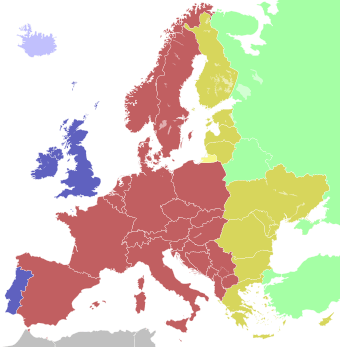Western European Summer Time facts for kids
Western European Summer Time (WEST) is a special way of setting clocks during the summer months. It's a type of daylight saving time, which means people move their clocks forward by one hour. This helps to make better use of the daylight. WEST is one hour ahead of Coordinated Universal Time (UTC).

| blue | Western European Time (UTC+0) Western European Summer Time (UTC+1) |
| light blue | Western European Time (UTC+0) |
| red | Central European Time (UTC+1) Central European Summer Time (UTC+2) |
| yellow | Eastern European Time (UTC+2) Eastern European Summer Time (UTC+3) |
| orange | Kaliningrad Time (UTC+3) |
| green | Further-eastern European Time (UTC+3), a.k.a. Moscow Time |
Contents
What is Western European Summer Time?
Western European Summer Time (WEST) is a system used in several countries to change their clocks for part of the year. This change is called daylight saving time. The main idea is to shift an hour of daylight from the early morning to the evening. This means the sun sets later, giving people more daylight hours in the evening for activities after school or work.
WEST is exactly one hour ahead of Coordinated Universal Time (UTC). UTC is the main time standard that the world uses to regulate clocks and time. Think of it like the world's time clock.
Where is WEST Used?
Many places use Western European Summer Time. These include:
- The Canary Islands (part of Spain)
- The Faroe Islands (part of Denmark)
- The Republic of Ireland
- The Crown dependencies (like Jersey and Guernsey)
- The Madeira islands (part of Portugal)
- Continental Portugal
- The United Kingdom
- Morocco in North Africa
Other Names for WEST
Western European Summer Time is known by different names in some places.
- British Summer Time (BST) is the name used in the United Kingdom.
- Irish Standard Time (IST) is the name used in Ireland. In the Irish language, this is called Am Caighdeánach na hÉireann (ACÉ). Sometimes, people also call it Irish Summer Time (Am Samhraidh na hÉireann).
When Do Clocks Change?
The time change for Western European Summer Time happens twice a year.
- Clocks are moved forward by one hour on the last Sunday in March. This marks the start of WEST.
- Clocks are moved back by one hour on the last Sunday in October. This marks the end of WEST.
Both of these changes happen at 01:00 UTC. During the winter months, when WEST is not in use, these places switch back to Greenwich Mean Time (UTC+0).
See also
 In Spanish: Horario de verano de Europa occidental para niños
In Spanish: Horario de verano de Europa occidental para niños
 | Precious Adams |
 | Lauren Anderson |
 | Janet Collins |

